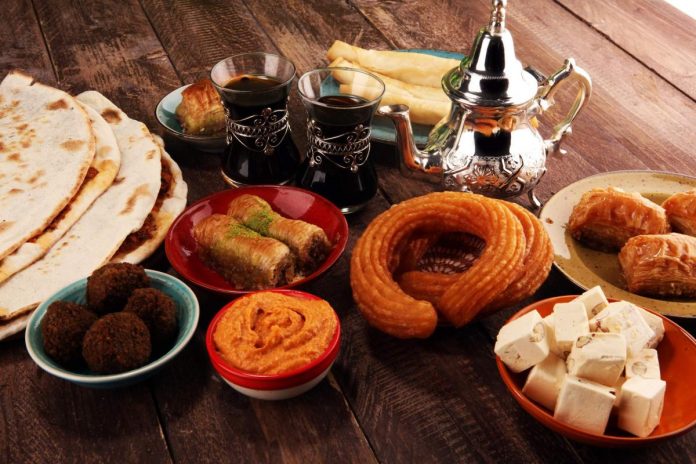Halal is an Arabic word that simply means lawful or permitted, but generally refers to what’s allowed under Islamic law. It’s the opposite of haram, which means unlawful or prohibited. Some things are very clear-cut halal or haram, however, as with a lot of religious law, other things can be open to interpretation.
When it comes to food and drink, halal is similar to the concept of kosher in Judaism. But what’s halal and what’s haram more broadly covers all aspects of life.
Non-muslims are sometimes familiar only with the term halal in regards to its role in animal slaughter. That’s largely because meat can be either halal or haram depending on how the animal was slaughtered. For that reason, halal meat is usually labelled as such in most non-muslim countries, whereas other products don’t need to be. Fruits and vegetables, for example, are always halal, so non-muslims are rarely confronted with the fact.
Halal meat
For meat to be certified halal, it must be slaughtered in a manner known as dhabiha. That means cutting through the jugular vein, carotid artery, and windpipe in order to drain all blood from the carcass. In Islam, the consumption of blood is considered haram. A Muslim must recite a dedication known as tasmiya or shahada during this process.
Carrion – an animal that dies of illness or natural causes – is also considered haram. An animal must be alive, healthy, and conscious at the time of slaughter for its meat to be considered halal.
Although halal slaughter supposedly has its origins in a respect for all life being sacred, the fact that the animals aren’t stunned beforehand is a source of much controversy. It would, however, be naive to presume that stunning is stringently applied in non-halal slaughter. Often a single attempt is considered enough, whether successful or not.
Additionally, some national halal certification bodies interpret halal slaughter to also include stipulations as to the sanity of the slaughterer and the treatment and comfort of the animal prior to its slaughter.
Not all meat can be made halal, however, regardless of how it was slaughtered. Animals that are always haram to eat include:
Pork and its by-products are strictly forbidden
Donkeys, mules, and horses
Fanged animals (cats, dogs, bears, etc)
Birds of prey
Reptiles
Some other animals, such as monkeys
Halal food
For the most part, vegan food is always halal. The one exception is when it contains alcohol. Alcohol and all intoxicants are considered haram.
Vegetarian food, especially dairy and eggs, is a little more complicated and depends on one’s interpretation of Islamic law. This is largely comes down to two reasons:
Dairy and eggs are often produced by methods involving non-halal animal slaughter (for instance, killing non-productive male chicks or calves at birth). Cheese may also contain non-halal animal rennet.
Some animals are often fed non-halal products as part of their diet, including pork by-products and potentially also non-halal pharmaceuticals.
Halal recipes
Looking for halal dinner ideas? Check out this mouthwatering lamb shank recipe from Cook Halaal.
Cook Halaal has many other halal recipes worth trying, including this chicken akhni (a rice and potato dish topped with chicken curry), and this halal version of bobotie – one of South Africa’s favourite comfort foods.





























